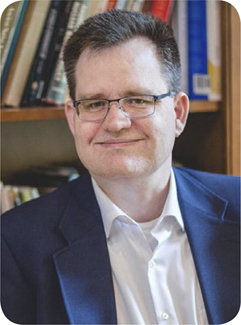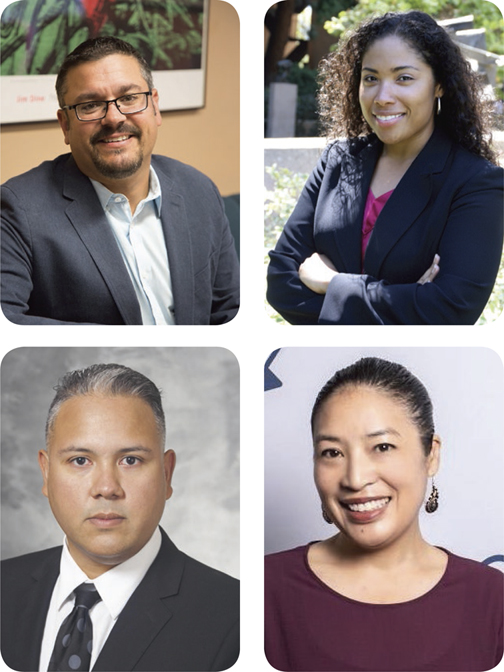Updates
Danielle S. Allen, James Bryant Conant University Professor and director of the Edmond J. Safra Center for Ethics at Harvard University received a 2019 Governor’s Award at the annual Massachusetts Humanities Dinner.
Nicholas Barnes has joined Grinnell College as visiting assistant professor of political science following the completion of a postdoctoral fellowship at Brown University’s Watson Institute for International and Public Affairs.
Elissa Berwick accepted a postdoctoral fellowship at Brown University’s Watson Institute for International and Public Affairs following the completion of her PhD at the Massachusetts Institute of Technology.
Laura Blume, a PhD candidate in political science at Boston University, will join the University of Nevada, Reno, as assistant professor of political science this fall.
Carmen Lea Dege has joined the Polonsky Academy at the Van Leer Jerusalem Institute as a postdoctoral fellow following the completion of her doctoral work at Yale University.
Ted Enamorado joined the University of North Carolina, Chapel Hill, as assistant professor of political science following the completion of his PhD at Princeton University.
Harrison P. Frye, formerly a junior faculty fellow at Georgetown University, is now assistant professor of political science at the University of Georgia.
Virginia Gray, Robert Watson Winston Distinguished Professor of Political Science at the University of North Carolina, Chapel Hill, retired after nearly 50 years in academia.
Nicholas Jacobs has joined the Department of Government at Colby College as faculty fellow.
Amaney Jamal, Edwards S. Sanford Professor of Politics at Princeton University was named winner of the 2019 Kuwait Prize in the field of economics and social sciences by the Kuwait Foundation for the Advancement of Sciences (KFAS).
Claudia Junghyun Kim has joined the Weatherhead Center for International Affairs at Harvard University following the completion of her PhD at Boston University.
Matthew J. Lacombe joined Barnard College as assistant professor of political science following the completion of his PhD at Northwestern University.
Cullen Nutt is now US Foreign Policy and International Security Fellow at Dartmouth College’s John Sloan Dickey Center following the completion of his PhD at the Massachusetts Institute of Technology.
Costas Panagopoulos, professor of political science, has been appointed chair of the Department of Political Science at Northeastern University.
Isabel Perera has joined Cornell University as assistant professor in the Department of Government following the completion of a postdoctoral fellowship at the University of Pennsylvania.
Andrew S. Rosenberg has joined the University of Florida as assistant professor of political science following the completion of his PhD at The Ohio State University.
Keep PS Informed
Let us know about your new academic appointment, award, or event. Email [email protected]
Keith E. Whittington Awarded Third Annual Thomas M. Cooley Book Prize
The Georgetown Center for the Constitution awarded Keith E. Whittington the 2020 Thomas M. Cooley Book Prize for his book Repugnant Laws: Judicial Review of Acts of Congress from the Founding to the Present (University Press of Kansas, 2019). Whittington, who is William Nelson Cromwell Professor of Politics at Princeton University, accepted the $50,000 prize at a ceremony on March 20, 2020.
The Center for the Constitution established the Thomas M. Cooley Book Prize, Symposium, and Judicial Lecture in 2018 to recognize exceptional scholarship that advances our understanding of the written Constitution. The 2020 symposium marks the third year the book award has been given—previously having gone to Richard H. Fallon, Jr. for Law and Legitimacy in the Supreme Court (Harvard University Press, 2018) and Gary Lawson and Guy Seidman for A Great Power of Attorney: Understanding the Fiduciary Constitution (University Press of Kansas, 2017).

Professor Randy Barnett (Georgetown Law School), who also serves as director of the Center for the Constitution, commented of Whittington’s book: “[t]his book is a must-read for any serious student of our Constitution... from now on, no discussion of the practice of judicial review can ignore this book’s empirical findings.”
At the two-day symposium, professor Whittington joined William Treanor (Georgetown Law), Nancy Maveety (Tulane University), Howard Gillman (University of California, Irvine), and Adam Carrington (Hillsdale College) in discussing the book. The event also honored Hon. Neomi Rao of the US Court of Appeals, DC Circuit, who was selected to deliver the Thomas M. Cooley Judicial Lecture.
Adapted from the Georgetown Law press release.
Scholarship Fund and Book Proceeds Honor Late Political Scientist
The University of Southern Maine has announced a new scholarship fund for undergraduate political science students in honor of Professor Oliver H. Woshinsky, who passed away last year. The fund will support junior and senior political science majors at USM. Proceeds from Woshinsky’s family history, Conflicted Legacy: How a Missionary’s Daughter and a Young Jewish Man from Odessa Met in Minneapolis, Married in China, and Raised an American Family, will also contribute to the scholarship fund.

Professor emeritus Bill Coogan, a former colleague of Woshinsky’s at the University of Southern Maine, commented “Oliver Woshinsky was an intellectual magnet, a generous colleague, and a dear friend for decades. Still, knowing him, I was taken aback as I read one jaw-dropping chapter after another recounting cultural blowups, tense wartime escapes, tales of family endurance and family tragedy. Conflicted Legacy tells a story at times inspirational, and at times horrifying, of one family battered time and again by the ferocity of 20th-century history.” Lynn Kuzma (Rutgers University, Newark) adds that the book is “an accessible true adventure of (mostly) survival and success against extraordinary odds.”
Inquiries about the book and scholarship fund can be directed to Oliver’s wife, Pat Garrett ([email protected]).
Political Science Undergraduates Among 2020 Rhodes Scholarship Winners
On November 23, 2019, the Rhodes Trust elected the 2020 class of American Rhodes Scholars, who will pursue graduate study at Oxford University beginning in October. Among the winners of the prestigious scholarship are five political science students: Stephen G. Damianos (University of Pennsylvania), Prathm Juneja (University of Notre Dame), Henry Wu (The Ohio State University), Jacob D. Reagan (University of Colorado, Boulder), and Christina K. Pao (Yale University).
This year’s 32 winners were selected from a pool of 963 applicants who were nominated by their colleges and universities. According to the Rhodes Trust, for the third consecutive year, the class is majority-minority and nearly half are first-generation Americans. Four of the political scientists in the 2020 cohort are currently Truman Scholars, and each will pursue a degree or degrees in the social sciences at Oxford. Damianos will pursue a DPhil in Migration Studies; Juneja will work towards both a MSc in Social Data Science and a Master of Public Policy; Wu plans to earn a MSc in Migration Studies and an MSc in Evidence-Based Social Intervention and Policy Evaluation; Reagan will pursue a MPhil in International Relations; and Pao will earn a MPhil in Sociology and Demography.
Since 1903, the Rhodes Trust has provided full financial support to scholarship winners to pursue a degree at the University of Oxford in partnership with the Second Century Founder, John McCall MacBain, and other generous benefactors. Each year, two outstanding scholars are selected in each of 16 US regions from a pool of thousands of applicants.
Adapted from the Rhodes Trust news release.
APSA’s RAISE the Vote Campaign Encourages Student Voting and Democratic Engagement
What steps can political science faculty take to encourage their students to register, vote, and otherwise engage in the political process? Responding to calls from APSA members for more direct support of faculty civic engagement efforts, APSA has introduced the RAISE the Vote campaign, where RAISE stands for “Resources to Amplify and Increase Student Engagement.” The campaign’s main goal is to increase college student registration, voting, and civic engagement through two key mechanisms: (1) Provide concrete steps and best practices that faculty can use in the classroom and on campus to encourage student engagement; and (2) highlight the research, teaching, and service of APSA members related to civic engagement and voting, and encourage faculty to use these resources in their classrooms.
The RAISE the Vote campaign draws on APSA’s strength as a membership association comprised of political science experts. In the lead up to the 2020 election, the RAISE the Vote campaign will share the research, teaching practices, and campus engagement strategies of these experts in the form of accessible blog posts and articles that faculty interested in encouraging student civic engagement can draw on and share with their students. In doing so, the campaign will provide concrete steps and best practices for faculty to encourage student engagement.

Each month of the campaign will feature a different theme. Some months will focus on broader strategies and models for civic engagement, while others will delve into specific research areas related to electoral and participatory politics, like “Polling, Forecasting, and Information” or “Voter Suppression, Voter Fraud, and Voter Engagement.”
More information about the campaign, including recent blog posts and articles, and instructions for how to join the campaign, can be found on the RAISE the Vote campaign website.
Adapted from the PSNow press release.
spotlight
Scholars of Race, Ethnicity, and Politics Set Sights on 2020 Election
The Collaborative Multiracial Post-Election Survey (CMPS), a multiyear research project that tests the political attitudes of black, white, Latinx, and Asian American voters, will take place once more following the 2020 national election. Principal investigators Matt Barreto and Lorrie Frasure-Yokley (University of California, Los Angeles), Edward Vargas (Arizona State University), and Janelle Wong (University of Maryland, College Park) will work with approximately 150 collaborators across the country to complete the ambitious survey.
Supported by a $940,000 grant from the National Science Foundation, this year’s CMPS will be the largest iteration of the project to date, drawing survey data from about 20,000 respondents. This year, the team plans to include previously unexamined demographics in the survey, including Native Americans, Native Hawaiians, Muslim Americans, Afro-Caribbean Americans, and LGBTQ Americans.
The inaugural CMPS in 2008 was the first multiracial and multilingual survey of registered voters across multiple states and regions following a presidential election. Each year, the survey has grown in size and scope. The 2016 CMPS, which was self-funded and led by the same team of principal investigators as the upcoming 2020 survey, produced data that resulted in dozens of publications from collaborators.
The 2020 survey is expected to begin in December 2020. Respondents will answer questions about diverse issues including health care, immigration, racial and social justice, election integrity, and the media. To learn more about the project, visit https://cmpsurvey.org/

Top left: Matt Barreto; top right: Lorrie Frasure-Yokley; bottom left: Edward Vargas; bottom right: Janelle Wong.
Adapted from the UCLA news release.


